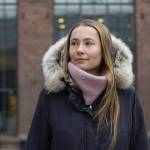A new network for Ukraine research
The existence of an established research community made it possible to build up a university-wide network at OsloMet for scholars doing research on issues related to Ukraine.
NIBR researchers also established UKRAINETT – a network for Ukrainian researchers in Norway. The purpose of the network is, among other things, to convey knowledge about Ukraine to Norwegian politicians, government administrators, private-sector actors, and civil society.
“The reconstruction of Ukraine has already begun, even though the war is ongoing. It is therefore important that actors who will be contributing to the country’s rebuilding understand Ukraine and the conditions there, so that their work will be as effective as possible,” says Aadne Aasland, researcher at NIBR and head of UKRAINETT.
UKRAINETT had its first meeting in April, followed by a launch event open to the public in September.
In November, the network held a two-day research seminar on OsloMet's campus that attracted nearly 40 participants who shared research findings and professional insights about the situation in the country. Aasland hopes this seminar will become an annual tradition.
“We also hope that UKRAINETT can serve as a scholarly network and hub for Ukrainian researchers who have had to flee because of the war," says Aasland. "Several refugees who are now in Norway contributed at our opening conference, both with presentations and in academic discussions."
The reconstruction of Ukraine has already begun, even though the war is ongoing. It is therefore important that actors who will be contributing to the country’s rebuilding understand Ukraine and the conditions there, so that their work will be as effective as possible.
– Aadne Aasland, researcher at NIBR and head of UKRAINETT
NIBR hosts Ukrainian researcher
One of the refugees who is participating actively in the network is 32-year-old Oleksandra Deineko, who fled to Norway in early March.
“Oleksandra, or Alex as we call her, is a sociologist at Karazin Kharkiv National University, with whom I have worked closely for several years,” says Aasland.
Kharkiv is located in north-eastern Ukraine, just 40 kilometers from the Russian border. The city came under heavy attack from the Russian army beginning from the start of the war. Deineko emphasises that she initially had no plans to flee her hometown.
“I had no access to bomb shelters, however, and the situation was getting worse and worse. After one week of living in a semi-occupied city, I wrote a message to my colleague Aadne Aasland and got an immediate answer: we will help you, come to Norway.”
Deineko is now a visiting researcher at NIBR supported by funding from the Scholars at Risk programme.
“My story is not unique—more than 60 % of Ukrainians who have come to Norway had networks here. The truth is that social networks all around the globe have saved many lives in this war.”
A gifted researcher and valued colleague
“Alex only had a small bag with her when we met her at Oslo airport after an arduous journey from Kharkiv,” Aasland recalls.
He says that Deineko has become an important resource person in NIBR's community of Ukraine scholars and has already participated in several research projects. Among other things, she interviewed Ukrainian refugees as part of a NIBR project conducted for the Norwegian Directorate of Immigration and the Directorate of Integration and Diversity about how refugees from Ukraine were received in the first months after arrival.
“Alex already speaks Norwegian very well and can use Norwegian as a working language. At the same time, she maintains contact with her home university in Kharkiv and teaches digitally there. I am full of admiration for how she copes with this major upheaval in her life, while also actively contributing to our good working environment at NIBR,” Aasland observes.
I had no access to bomb shelters, and the situation i Kharkiv was getting worse and worse. After one week of living in a semi-occupied city, I wrote a message to my colleague Aadne Aasland and got an immediate answer: we will help you, come to Norway.
– Visiting researcher Olexandra Deineko





